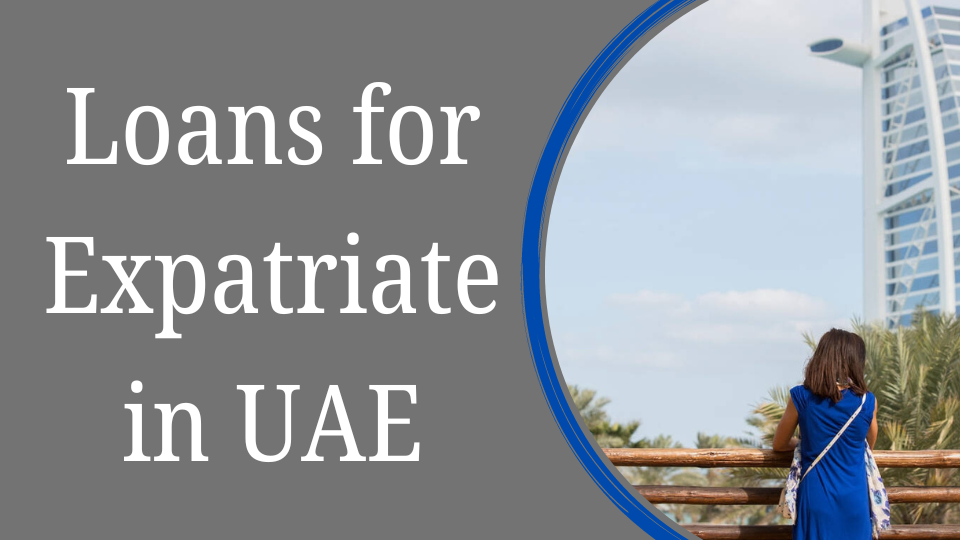Loans for Expatriate in UAE: Your Comprehensive Guide
Expatriates in the United Arab Emirates can obtain loans from various banks and financial institutions. These loans cater to personal, auto, and home financing needs.
Expatriates residing in the United Arab Emirates often require financial assistance for various purposes, such as buying a car, purchasing a home, or covering personal expenses. Banks and financial institutions in the UAE offer a range of loan options specifically designed to meet the needs of expatriates.
These loans typically come with competitive interest rates, flexible repayment terms, and minimal documentation requirements. Eligibility criteria may include a stable income, a valid residency visa, and a good credit history. By meeting these requirements, expatriates can secure the necessary funds to achieve their financial goals while living and working in the United Arab Emirates.
Types Of Loans
Living in the United Arab Emiratesas an expatriate offers many opportunities. Sometimes, you might need financial assistance for various needs. Different types of loans can help you achieve your goals. Let’s explore the types of loans available for expatriates in the United Arab Emirates.
Personal Loans
Personal loans are a popular choice among expatriates. These loans can be used for various purposes like paying off debts, planning a wedding, or funding education. Banks in the United Arab Emirates offer attractive interest rates and flexible repayment terms for personal loans.
Here are some key features of personal loans:
- Loan amounts ranging from AED 10,000 to AED 500,000.
- Repayment periods from 12 to 48 months.
- Fixed and variable interest rates.
- Minimal documentation required.
To apply for a personal loan, you usually need:
| Requirement | Description |
|---|---|
| Valid Passport | Copy of your passport with a valid visa. |
| Salary Certificate | Proof of your monthly income. |
| Bank Statements | Statements from the past 3-6 months. |
Home Loans
Home loans are ideal for expatriates looking to buy property in the UAE. These loans offer high loan amounts and long repayment terms. Banks provide competitive interest rates and various loan packages.
Key features of home loans:
- Loan amounts up to AED 10 million.
- Repayment terms up to 25 years.
- Fixed and variable interest rates.
- Option for Islamic home finance.
To apply for a home loan, you usually need:
| Requirement | Description |
|---|---|
| Property Documents | Proof of the property you wish to buy. |
| Income Proof | Salary certificate or business income proof. |
| Bank Statements | Statements from the past 6-12 months. |
Car Loans
Car loans help expatriates purchase new or used cars. These loans are easy to obtain with minimal paperwork. Banks offer attractive interest rates and quick approval.
Key features of car loans:
- Loan amounts up to AED 500,000.
- Repayment terms from 12 to 60 months.
- Fixed interest rates.
- No salary transfer required.
To apply for a car loan, you usually need:
| Requirement | Description |
|---|---|
| Car Purchase Agreement | Proof of the car you wish to buy. |
| Income Proof | Salary certificate or business income proof. |
| Bank Statements | Statements from the past 3-6 months. |
Eligibility Criteria
Getting a loan as an expatriate in the UAE can be a challenging process. Banks and financial institutions have specific eligibility criteria that need to be met. Understanding these criteria is essential for a smooth application process. This blog post will guide you through the eligibility requirements, including income, employment status, and credit score.
Income Requirements
Banks in the UAE have specific income requirements for expatriates. A stable and sufficient income is crucial for loan approval. Here are some common income requirements:
- Minimum monthly income: Most banks require a minimum monthly salary of AED 5,000.
- Salary transfer: Some banks require your salary to be transferred to their account.
- Proof of income: You need to provide salary slips and bank statements for the last 3-6 months.
Below is a table summarizing the income requirements of some major banks:
| Bank | Minimum Monthly Income (AED) | Salary Transfer Required |
|---|---|---|
| Abu Dhabi Commercial Bank | 5,000 | Yes |
| Al Hilal Bank | 7,000 | No |
| HSBC Bank Middle East | 10,000 | Yes |
Employment Status
Employment status is another crucial factor for loan approval. Banks prefer applicants with stable jobs. Here are some points to consider:
- Permanent employment: Being a permanent employee increases your chances of approval.
- Employment duration: You should be employed for at least six months in your current job.
- Employer’s reputation: Working for a well-known company can be advantageous.
Some banks may also consider applicants with temporary or contractual jobs. However, the criteria may be stricter. Self-employed individuals may need to show business records and tax returns for the last few years.
Credit Score
A good credit score is essential for loan approval. Banks use credit scores to assess your financial health. Here are some important points about credit scores:
- Minimum score: A credit score above 650 is generally considered good.
- Credit history: A long and positive credit history can improve your score.
- Debt-to-income ratio: Keeping your debts low relative to your income is beneficial.
If your credit score is low, you can take steps to improve it. Paying off debts and maintaining low credit card balances can help. Regularly checking your credit report for errors is also advisable.
Application Process
Living in the UAE as an expatriate offers many opportunities. Yet, finding a loan can be tricky. Understanding the application process is key. This guide will help you know what is needed. It also compares online and in-person applications. Lastly, it discusses the processing time.
Required Documents
To apply for a loan, you need specific documents. These documents prove your identity and financial status. Here is a list of the most common documents required:
- Passport copy: A clear copy of your passport.
- Visa copy: A valid UAE residence visa.
- Emirates ID: A copy of your Emirates ID card.
- Salary certificate: A letter from your employer.
- Bank statements: Last 3 to 6 months of statements.
- Proof of address: A utility bill or rental agreement.
These documents help the bank assess your eligibility. They check your ability to repay the loan. Ensure all documents are up-to-date.
Online Vs In-person
Applying for a loan can be done online or in-person. Each method has its pros and cons. Online applications are convenient. You can apply from anywhere. The process is often faster. Many banks have user-friendly websites. They guide you through each step.
In-person applications offer a personal touch. You can ask questions directly. Bank staff can provide immediate answers. Some people feel more confident with face-to-face interaction. It can also be easier to submit documents.
Here is a comparison:
| Online | In-Person |
|---|---|
| Convenient, apply anytime | Personal interaction |
| Faster processing | Immediate answers |
| Easy document upload | Help with documents |
Processing Time
The time it takes to process a loan varies. It depends on the bank and your documents. Online applications are usually quicker. They can take a few days to a week. Some banks offer instant approvals. This means you get a decision within minutes.
In-person applications might take longer. This is because of the manual checks. It can take one to two weeks. Sometimes, it may take even longer. Ensure all your documents are correct. This helps speed up the process.
Keep in touch with the bank. Ask for updates on your application. Make sure there are no missing documents. This can help avoid delays. Always be prepared for additional checks.
Interest Rates
Expatriates in the United Arab Emirates often need loans for various reasons. These include buying a home, starting a business, or even personal needs. Understanding interest rates is crucial. It helps in making informed decisions. This guide will explore different aspects of interest rates for expatriates in the UAE.
Fixed Vs Variable Rates
Fixed interest rates remain the same throughout the loan term. This provides stability and helps in budgeting. You know exactly how much you will pay each month. Variable interest rates, on the other hand, can change over time. They depend on the market conditions. Sometimes, they start lower than fixed rates. But they can increase, making monthly payments higher.
Here are some key points to consider:
- Fixed rates offer predictability.
- Variable rates can be lower initially.
- Fixed rates are generally higher than starting variable rates.
- Variable rates can fluctuate, leading to uncertainty.
Choosing between fixed and variable rates depends on your financial situation. If you prefer stability, fixed rates are better. If you can handle risk, variable rates might save you money initially.
Comparative Analysis
Comparing fixed and variable rates can be insightful. A side-by-side comparison helps in understanding the pros and cons. Here is a table to illustrate:
| Aspect | Fixed Rates | Variable Rates |
|---|---|---|
| Stability | High | Low |
| Initial Rate | Higher | Lower |
| Monthly Payment | Consistent | Fluctuates |
| Risk | Low | High |
Fixed rates provide peace of mind. You know what to expect every month. Variable rates can be tempting due to lower initial rates. But they carry the risk of rising costs. This could strain your budget. Careful consideration and planning are needed.
Factors Affecting Rates
Several factors influence interest rates for loans in the United Arab Emirates. Economic conditions play a significant role. When the economy is strong, rates tend to be higher. Inflation rates also impact interest rates. Higher inflation usually leads to higher interest rates.
Credit score is another crucial factor. A better credit score often results in lower interest rates. Loan amount and term length also matter. Larger loans or longer terms can attract different rates. Bank policies and market competition can also affect the rates offered to expatriates.
- Economic conditions
- Inflation rates
- Credit score
- Loan amount
- Term length
- Bank policies
- Market competition
Understanding these factors can help expatriates secure better loan terms. It is crucial to do thorough research. This helps in finding the best rates available.
Top Banks For Expat Loans
Expatriates in the United Arab Emirates often need financial help. Many banks offer loans tailored for expats. These loans help with various needs, such as buying a car or home. Understanding the options available can make a big difference. Here, we explore the top banks for expat loans in the UAE.
Local Banks
Local banks in the United Arab Emirates offer great loan options for expatriates. They understand the needs of the expat community. Some of the popular local banks include Emirates NBD, Abu Dhabi Commercial Bank (ADCB), and Dubai Islamic Bank (DIB).
Emirates NBD offers personal loans with flexible terms. Their loan amounts can go up to AED 4 million. They also have competitive interest rates.
Abu Dhabi Commercial Bank (ADCB) provides loans for expatriates with quick approval processes. They offer personal loans up to AED 600,000. They also offer salary transfer options for ease.
Dubai Islamic Bank (DIB) is another good option. They offer Sharia-compliant loans with easy repayment options. They have a minimum salary requirement of AED 3,000.
- Emirates NBD: Flexible terms, up to AED 4 million
- ADCB: Quick approval, up to AED 600,000
- DIB: Sharia-compliant, easy repayment
International Banks
International banks also cater to expatriates in the United Arab Emirates. They offer various loan products designed to meet expat needs. Some of the top international banks are HSBC, Standard Chartered, and Citibank.
HSBC offers personal loans with attractive interest rates. They provide loan amounts up to AED 600,000. They also have a hassle-free application process.
Standard Chartered has a range of loan products for expats. Their personal loans can go up to AED 500,000. They also offer flexible repayment terms.
Citibank is known for its customer service. They offer loans with competitive rates. Expats can borrow up to AED 250,000.
- HSBC: Attractive rates, up to AED 600,000
- Standard Chartered: Flexible terms, up to AED 500,000
- Citibank: Competitive rates, up to AED 250,000
Fintech Options
Fintech companies provide innovative loan solutions for expatriates. They offer quick and easy loan applications online. Some popular fintech options include Souqalmal, Yallacompare, and Compareit4me.
Souqalmal allows expats to compare various loan options. They offer detailed information on interest rates and terms. The platform is user-friendly and easy to navigate.
Yallacompare is another great option for expats. They provide a wide range of loan comparisons. The application process is simple and fast.
Compareit4me helps expats find the best loan deals. They offer comparisons of different banks and their loan products. The platform saves time and effort for expats.
- Souqalmal: User-friendly, detailed comparisons
- Yallacompare: Wide range, simple application
- Compareit4me: Best deals, time-saving
Common Challenges
Securing a loan as an expatriate in the United Arab Emirates can be a daunting task. Various challenges can arise, making it difficult to navigate the financial landscape. Understanding these challenges can help expatriates better prepare and increase their chances of obtaining a loan.
Language Barriers
Language differences can pose significant challenges for expatriates seeking loans in the UAE. Many expatriates may not be fluent in Arabic, the official language of the United Arab Emirates. This can create misunderstandings and complications during the loan application process.
Important documents and communication with banks are often in Arabic. Translating these documents can be time-consuming and costly. Misinterpretations can lead to errors in the application, which can result in delays or even rejections.
- Misunderstandings: Critical information can be lost in translation.
- Document Translation: Translating documents can be expensive.
- Communication Issues: Difficulty in communicating with bank officials.
Many banks do offer services in English, but nuances and specific terms can still be confusing. Seeking help from a professional translator or an advisor well-versed in both languages can be beneficial.
Regulatory Issues
The UAE has strict regulations governing the financial sector. These regulations can be different from those in an expatriate’s home country. Understanding these regulations is crucial for expatriates seeking loans.
Expatriates must meet specific criteria set by banks and financial institutions. These criteria can include minimum salary requirements, employment status, and length of residency. Failing to meet these criteria can result in loan application rejections.
| Requirement | Details |
|---|---|
| Minimum Salary | Varies by bank, often AED 5,000 or more |
| Employment Status | Must be employed with a valid contract |
| Length of Residency | Often requires at least 6 months of residency |
Understanding and meeting these requirements is essential. Consulting with a financial advisor familiar with UAE regulations can help navigate these complexities.
Cultural Differences
Cultural differences can also impact the loan application process. The UAE has a unique cultural landscape that can be different from what expatriates are used to.
For example, the concept of interest and banking ethics can vary. Islamic banking, which follows Sharia law, is prevalent in the UAE. This type of banking prohibits charging interest on loans, which can be confusing for expatriates used to conventional banking systems.
- Understanding Islamic Banking: No interest charged on loans.
- Different Banking Ethics: Adhering to Sharia law.
- Adaptation: Learning and adapting to the local banking culture.
Expatriates should take time to understand these cultural nuances. Seeking guidance from locals or professionals familiar with both cultures can ease the process.
Repayment Options
Expatriates in the United Arab Emirates often seek loans for various needs. These needs can range from personal expenses to business investments. Understanding repayment options is crucial. This helps expatriates manage their finances better. Various banks and financial institutions offer different plans. These plans cater to the diverse needs of expatriates.
Flexible Plans
Many banks in the United Arab Emirates offer flexible repayment plans. These plans make it easier for expatriates to repay their loans. Here are some features of flexible plans:
- Variable Interest Rates: Interest rates can change based on market conditions.
- Customizable Tenure: Borrowers can choose the loan period that suits them best.
- Income-Based Repayments: Monthly payments can be based on the borrower’s income.
Flexible plans provide a lot of benefits. They allow borrowers to adjust their payments. This can be especially helpful during financial hardships. Borrowers can also choose to make extra payments. This can help reduce the overall loan term. These plans are designed to offer maximum convenience.
Early Repayment Penalties
Many loans come with early repayment penalties. These penalties are charged when a borrower pays off a loan early. Here are some common reasons for these penalties:
- Bank’s Lost Interest: Banks lose out on interest when loans are paid off early.
- Administrative Costs: There are costs involved in processing early repayments.
Understanding these penalties is important. It helps borrowers make informed decisions. Some loans may have high penalties. Others may have none at all. It’s important to read the loan agreement carefully. Knowing the penalties can help avoid unexpected costs. Borrowers should always ask about these penalties before signing a loan agreement.
Loan Consolidation
Loan consolidation is another repayment option. It allows borrowers to combine multiple loans into one. Here are some benefits of loan consolidation:
- Single Monthly Payment: Makes it easier to manage finances.
- Lower Interest Rates: Consolidated loans often come with lower rates.
- Extended Repayment Period: Borrowers can choose a longer repayment term.
Loan consolidation can simplify debt management. It reduces the hassle of multiple payments. Borrowers can also save money on interest. This option is particularly useful for expatriates with multiple debts. Consolidating loans can provide financial relief. It allows for better financial planning.
Tips For Expatriates
Living in the UAE as an expatriate can be exciting. But finding the right loan can be tricky. Many expats need help to get loans for homes, cars, or starting a business. Knowing some tips can make this process easier. These tips can help you get the best loan and save money.
Improving Credit Score
Having a good credit score is very important. Banks look at your score before giving you a loan. Here are some ways to improve your credit score:
- Always pay your bills on time. Late payments can hurt your score.
- Try to reduce your debt. The less you owe, the better your score.
- Don’t apply for too many loans at once. Each application can lower your score.
- Keep old accounts open. Long credit history can improve your score.
It takes time to build a good credit score. Start working on it today. Your future self will thank you.
Negotiating Terms
Getting a loan with good terms is important. Here are some tips for negotiating:
- Research different banks. Some banks offer better terms than others.
- Ask for lower interest rates. A lower rate can save you money over time.
- Check for fees. Some loans have hidden fees that can add up.
- Ask about flexible payments. Some banks let you change your payment plan if needed.
Be confident when talking to banks. They want your business. You have the power to ask for better terms.
Seeking Financial Advice
Getting help from a financial advisor can be very useful. They know a lot about loans and money. Here are reasons to see a financial advisor:
- Get expert advice. They can help you understand different loans.
- Save time. They can do the research for you.
- Plan your future. They can help you make a budget and plan for the future.
Choosing the right advisor is key. Look for someone with good reviews. Make sure they understand your needs. A good advisor can make a big difference in your financial life.
Conclusion
Navigating the loan process as an expatriate in the UAE can be straightforward with the right information. Research your options and choose a reputable lender. Stay informed about interest rates and eligibility criteria. With careful planning, securing a loan can enhance your financial stability in the UAE.





